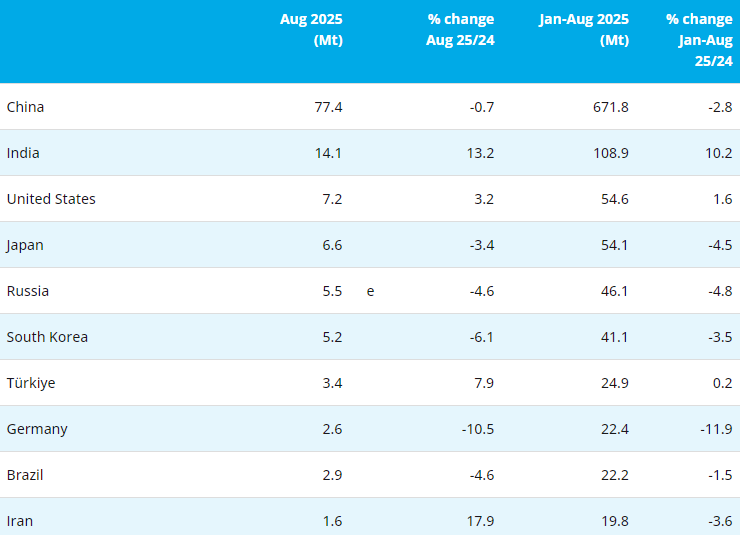China's nickel pig iron producers are turning in droves to a new technology that allows them to survive at lower prices, a move that suggests nickel prices, already mired at four-year lows, could fall further.
As nickel prices near $14 000/t, however, output cuts by loss-making producers with higher costs could steady the market, analysts said.
Nickel, mainly used to make stainless steel, is down 17% this year. It is the worst performer of a industrial metals complex hit hard by China's slowing growth.
Fed by a commodity boom, prices peaked above $50 000/t in 2007.
Production of nickel pig iron in China, a cheaper substitute for pure nickel used as feedstock by stainless steel mills, has more than quadrupled to an estimated 400 000 t this year from 89 000 t in 2008, according to Macquarie.
At the same time, technical innovations have slashed costs, which have in turn lowered the floor for nickel prices.
The break-even cost for nickel pig iron produced by rotary kiln electric furnace (RKEF) technology is now as low as $12 500/t and its market share has soared, said Dennis Zamora, senior VP for marketing and strategic planning at Nickel Asia Corp.
RKEF technology uses about a third less power than conventional production methods.
"At the moment, around 30% of the whole supply in China is made out of RKEF and that figure is growing so that next year you'll have 50%," Zamora said in an interview.
The Philippine company is one of the world's lowest-cost producers of nickel laterite ore, the low-nickel-content material used in nickel pig iron, 60% of which it ships to China.
PRODUCTION CUTBACKS?
The rise of nickel pig iron, and RKEF plants in particular, has won market share from refined nickel.
Combined with a global nickel surplus, this has helped send benchmark nickel on the London Metal Exchange (LME) spiralling lower to near $14 000/t this week, its weakest level since 2009.
Current low prices are hurting producers using older, higher-cost technology, who are expected to cut output.
"There's no magic line that will prevent the price from sliding below $14 000, but at that level I think we will start to see some response from the nickel pig iron producers in China," said analyst Gayle Berry at Barclays in London.
"We did see that last year when prices hit $15 000. There were some quite substantial cuts."
Prices could linger at lower levels because news of output cuts in China are often slow to emerge, said analyst Stephen Briggs at BNP Paribas.
"The trouble with cutbacks among the NPI plants, is that it's extremely hard to monitor what's happening and the news only filters out secondhand," he said.
Data this week from the International Nickel Study Group was the latest evidence of a market also burdened by overproduction outside of China.
The nickel market recorded a surplus of 32 900 t during the first four months of the year.
In April, the INSG forecast an annual surplus of 90 000 t this year.
"Fundamentally it's pretty grim, it's just a question of whether the price is low enough for the market to feel that the producers will have to address this now chronic surplus," Briggs said.
Processing of nickel laterite ore, through high pressure acid leach projects, such as Ramu in Papua New Guinea and Ambatovy in Madagascar, have in general been very successful, providing more supply for pig iron producers, said Joel Crane of Morgan Stanley in Melbourne.
Of the three nickel pig iron production methods, RKEF has enjoyed the most popularity due to lower costs and to its higher quality. It can be used in popular 300 series stainless steel for a fraction of the cost of refined nickel.
JP Morgan has estimated that NPI's market share in 300 series stainless steel will increase to over 90% in the next few years from 75% at present as it ramps up its exports to South East Asia and Europe.
The stainless steel industry, also suffering from huge over capacity, is approaching the seasonally weaker summer months.
Copyright © 2013 Ferro-Alloys.Com. All Rights Reserved. Without permission, any unit and individual shall not copy or reprint!
- [Editor:editor]



 Save
Save Print
Print Daily News
Daily News Research
Research Magazine
Magazine Company Database
Company Database Customized Database
Customized Database Conferences
Conferences Advertisement
Advertisement Trade
Trade















 Online inquiry
Online inquiry Contact
Contact

Tell Us What You Think